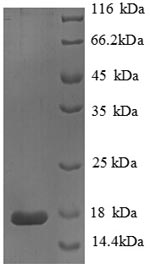CUSABIO transfected the expression vector which inserted the recombinant DNA into the E.coli, cultured the cells, and then induced the transcription and translation of the cloned vector. The N-terminal 6xHis tag sequence was appended to the gene coding for the E.coli of the human PLA2G2A protein to form the recombinant DNA. The recombinant human PLA2G2A was expressed as N-terminal 6xHis-tagged fusion. The purity of the protein is greater than 90% assayed by SDS-PAGE. It has an apparent molecular weight of approximately 17 kDa.
Pla2g2a has been identified as a susceptibility gene for cancer of the small and large intestine. Interestingly, unlike most previously identified tumor susceptibility genes, Pla2g2a does not behave like a classical oncogene or tumor suppressor gene. PLA2G2A was specifically expressed in lines with constitutive Wnt activity, implicating B-catenin–dependent Wnt signaling as a major upstream regulator of PLA2G2A expression. In GC, patients with tumors expressing high levels of PLA2G2A, a secreted phospholipase, have been shown to exhibit significantly improved survival compared with patients with low PLA2G2A–expressing tumors. Although PLA2G2A has been proposed as a potential tumor suppressor, evidence supporting this model is conflicting. Current studies support the notion that in addition to being a prognostic biomarker, PLA2G2A plays an intimate functional role in inhibiting GC progression. One implication of our findings is that because PLA2G2A is often underexpressed in late-stage and metastatic tumors, it is plausible that the reintroduction of PLA2G2A into aggressive tumors, by either gene therapy, administration of PLA2G2A protein, or intriguingly via epigenetic reactivation, might constitute a novel therapy for late-stage GC.






